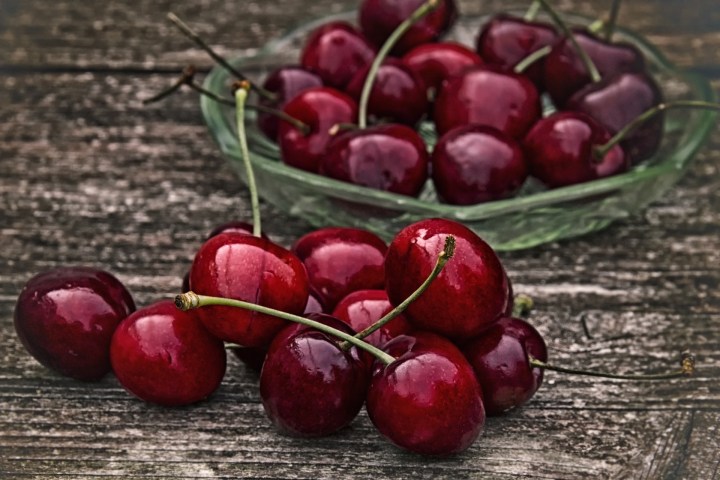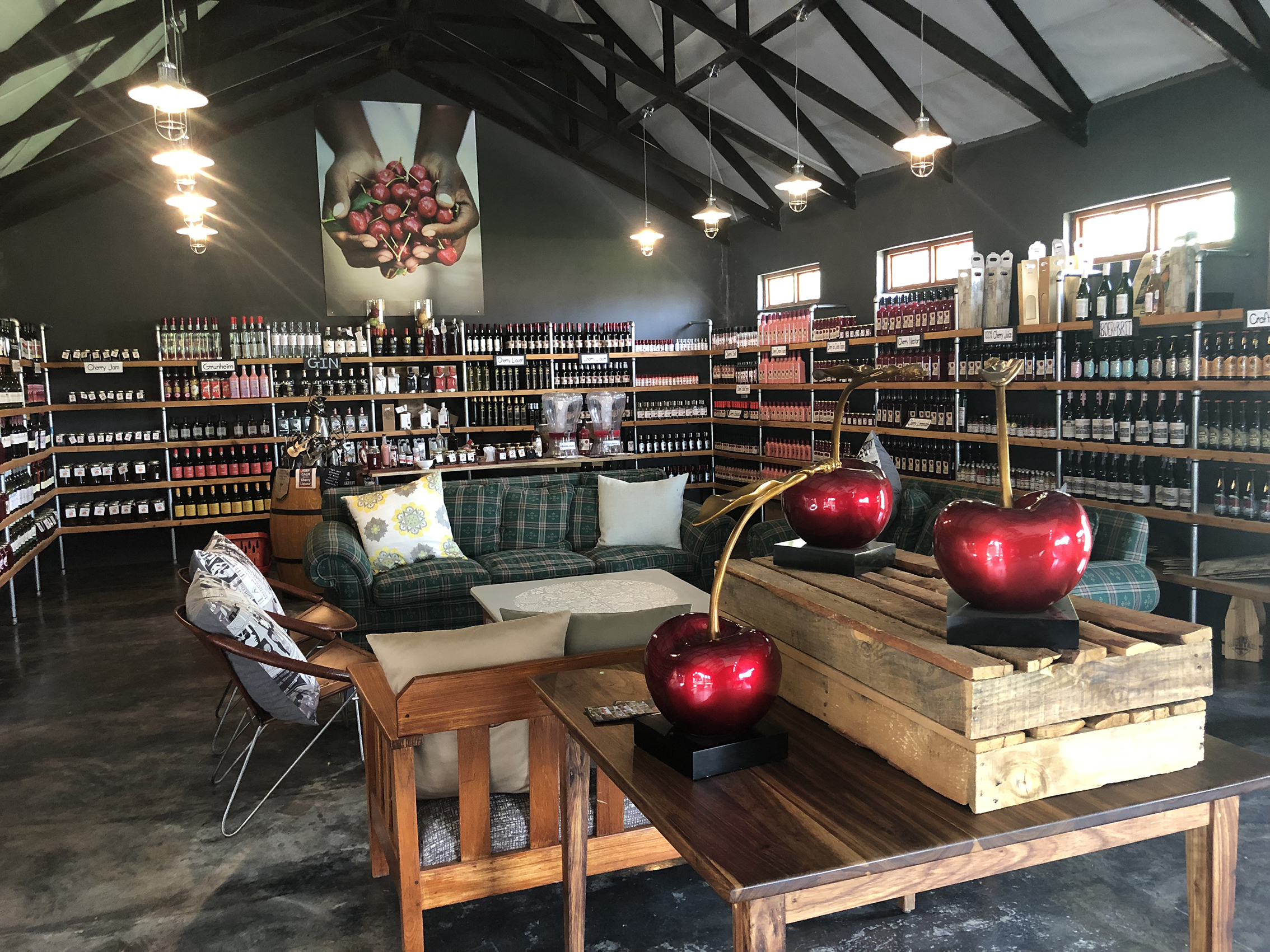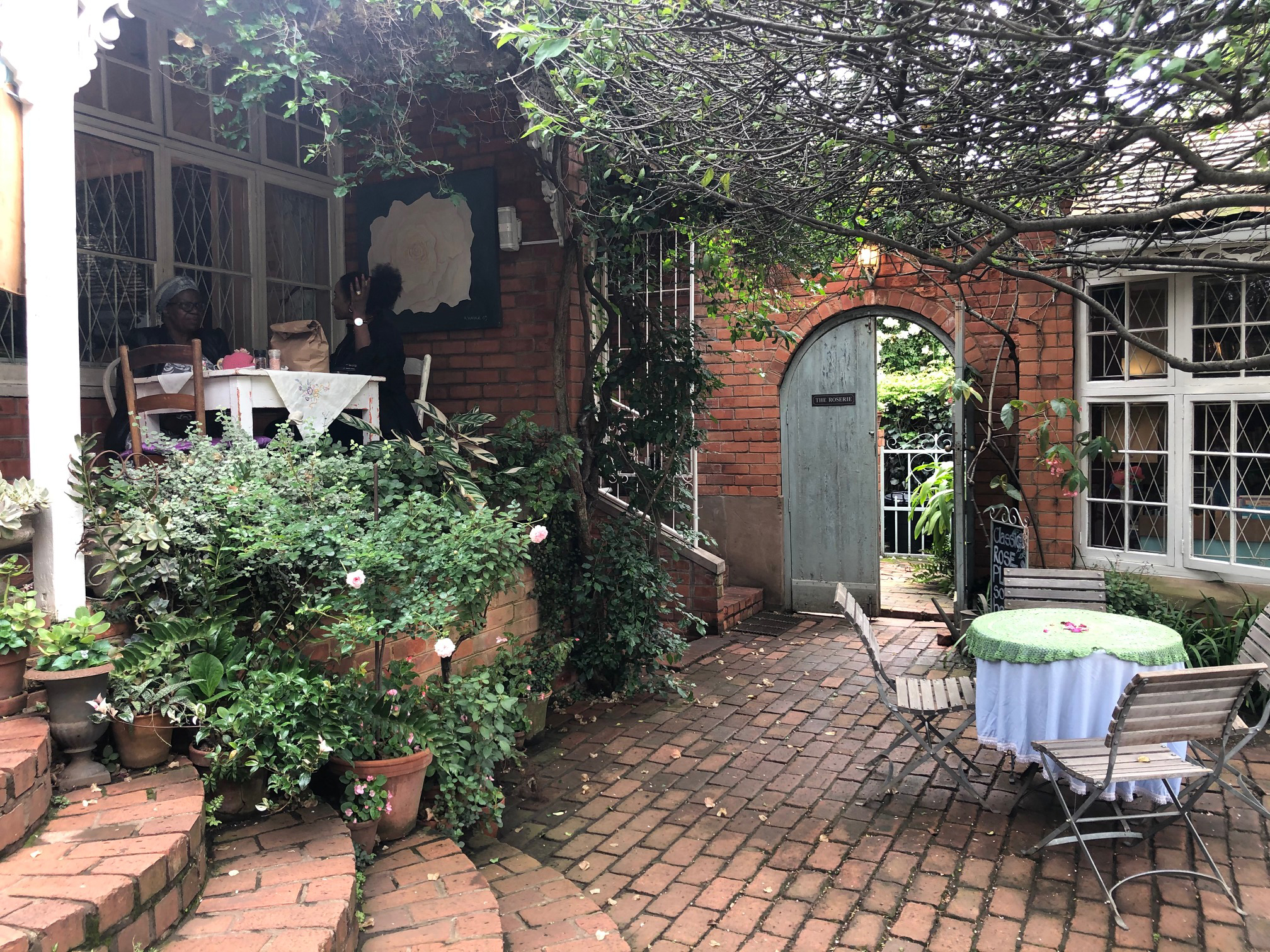GASTROTURF
Rainclouds & Roadkill: A journey through Cherry Country to the Kingdom of Rain

As you traverse the southern Free State, marvelling at the golden rockfaces and red-brown earth contrasting with the intense verdancy of the vegetation around Clocolan and Clarens, it becomes clear that all of your rain is going to them – and you chuckle dryly at the thought that they have too much of what you have too little of.
The national and regional roads are alive with animal denizens who watch, unblinking in their puzzlement, as humans fly by in their shiny, rumbling chariots. Or drive right over them, their life removed in the second it takes for a driver not to see the creature; or ignores it and drives on anyway.
Between Ladybrand, with its potholes the size of spatchcocked turtles, and Hobhouse, which moulders in insolent tribute to the heroine after whom it is named, a rooikat twitches in its death throes while being picked at by a ravenous pied crow. The hapless creature might consider itself lucky, relative to the fate of sheep and lambs in parts of the sun-parched Karoo, where the black and white pied crows are known to peck the eyes out of lambs still wet from the womb, and of adult sheep left to wander the veld, unseeing, until the farmer finds them and delivers the ironically kind coup de grace.
On the verge of the road a few kilometres away, a cowherd wrapped in a Basotho blanket and topped by a conical Basotho hat taps his crook against the rump of a cow veering into the road. The beast turns and lumbers back to its meagre grazing. The driver of the car that’s just whizzed past peers into his rear view mirror, pondering. The vegan pincer movement somewhere beyond the distant blue mountains would have the beasts redundant, not just the animals but their cowherd, who has known no other pursuit in his life; raised to it from birth, and has never spent a day of his life without cows at the centre of everything.
Further on, the car slows to wait as a troupe of 30-odd animals crosses. Not a flock of sheep or herd of cows: this motley crew includes cows, goats and ewes with young at foot. A herdsman flails his stokkie in the air at the approach of a mean-eyed crow.
Soon there’s another herdsman over on the other verge with his charges, and another a few kilometres further along, as they range along the lowest foothills of the Malutis to ensure that their stock gets enough to eat. They do look reasonably well fed. Unlike some of the scrawny sheep and cattle you’ve seen in the dryer parts of the Eastern Cape, where farmers strain their eyes against the sun as if yearning for the uncaring giant orb to be conquered by the Gods of Rain. You imagine forbidding folds of cumulus forming and charging towards you, to unleash the one thing that can make the difference in the lives and fortunes of these desperate men and women: water. Just water. That’s all it would take.
And on you drive, and the terrain changes dramatically the further away from the Eastern Cape you go. Before long you’re in cherry country, and it’s cherry season, for a few more weeks. The mountains are much closer now, the air cooler, wetter. You feel moist air on your cheeks for the first time since it last rained on your home grounds, in March. But this is not Cape Town so is of little consequence in the greater scheme of South African life. Just some farmers battling to keep their livestock alive. Let alone their business, serving the massive debt to the Land Bank.
You’ve been watching the weather maps on at least three apps on your iPhone for weeks, and winced every time you’ve seen, or been told, that KwaZulu-Natal’s farmers are having problems because there’s just too much rain. And as you traverse the beautiful southern reaches of the Free State, truly some of the country’s most awe-inspiring scenery, marvelling at the golden rockfaces and red-brown earth contrasting with the intense verdancy of the vegetation around Clocolan and Clarens, it becomes clear that all of your rain is going to them – and you chuckle dryly at the thought that they have too much of what you have too little of. No, that’s imprecise: of what you have none of. And you ponder on the life-destroying irony of that as the Golden Gate National Park comes into view, and soon afterwards, once you’ve turned off before Harrismith, the magnificent Sterkfontein Dam leers at you with its abundance of what you yearn for.
A day earlier, three cars were converging on Clarens, from Cape Town, Pietermaritzburg and Cradock, for a special family weekend. You’d hired a big house called Apple Orchard, via airbnb, and it’s turned out to be even better than it looked in the photos, although it lacks that one thing that you remember your previous two rentals in Clarens also did not have: WiFi. But in a group like this somebody’s bound to have brought a router of some kind, and your son-in-law Neal duly produces one so that we can all unthinkingly connect with the outside world we have come here to escape. Maybe Clarens has a point.
You’ve brought picanha and skilpadjies for the Friday night braai, and have some fun teasing the KZN cousins about the strange little balls of something meaty that are unfamiliar to them. “It’s lamb’s liver wrapped in caul fat,” you say, to puzzled expressions. You help them out, wickedly enjoying the moment: “The lining of a sheep’s stomach.”
“Ewwwwww!”
Evidently news of this Karoo delicacy has not yet reached the colonial outpost. The Hilton crew have brought fat, chunky KZN Midlands boerewors from Merrivale, where the local butchery’s meat is apparently highly sought-after. Oh no no no, says a boyfriend tagging along, ours is much better. He farms in an area that was hit by a frightening tornado days earlier. There are videos circulating on Facebook and WhatsApp about it.
The picanhas are cooked whole on hellish-hot coals, and the KZN Midlands types who know their steak pronounce it the best cut they’ve ever eaten. Another tick for picanha, which deserves to become as popular as rump and sirloin; nay, more popular. It’s just better.
You make cheat cherry ice cream with the cherry liqueurs you bought at Constantia Cherry Farm’s fabulous farm stall outside Clocolan, undoubtedly one of the best farm stalls in South Africa. One is a straightforward cherry liqueur, the other a creamy version. The cherry cream liqueur gets stirred into a two-litre brick of bought vanilla ice cream and put in the freezer to be ready for later on. The cherries themselves are pitted and halved, and steeped for hours in the clear cherry liqueur, a true beauty on the palate. It’s pronounced better than the skilpadies.

Liqueurs and other cherry drink products at Constantia Cherry Farm, Clocolan, southern Free State. Photo: Tony Jackman
After ogling the Sterkfontein Dam’s watery treasure and stopping, below the winding pass, at the Outspan and Coffee Patch for a great breakfast and even better strawberry smoothies – and picking up some of their biltong, the recipe for which they claim goes back to Voortrekker days (does one still boast about that sort of thing?) – we’re forced by circumstances on to the N3 for the stretch to Nottingham Road, but ahead of us is something we haven’t seen in months: a seemingly impenetrable wall of black cloud. Half an hour before we reach Notties, as the famed Midlands Hotel is known, we’re in driving rain with limited visibility. We spend two days and nights in rain alternating with mist, temperatures in the low 20s.
What to make of this terrain. My wife, who was born to it, loves it, as do the Hilton clan. Understandably. For me, it’s all too easy. I like my plants to do battle with the aridity of the hard, unsmiling Karoo earth, and come out the victor. I like them to fight, leaf and bud, for their days in the sun, while perhaps longing, like their human compatriots, for rain. At least, their humans will be able to water them, as long as the water in town doesn’t run out. As it will do next week, when you will be sitting writing this column with 44 (at last count) courgette plants having been weaned from seed to displaying their second set of leaves, yet have not been able to water them for two days.

Rosehurst. Photo: Tony Jackman
We’ll drive from Nottingham Road the next day to Pietermaritzburg to make our ritual visit to Rosehurst, the most beautiful little house filled with nostalgia and lovely things, its formal English garden and little book store lined with literary treasures, its blackboard menu scrawled with temptations, and the inevitable Rosehurst pink lemonade. While sipping it, you consider forgiving KZN for stealing your rain.
Coda
After I’d published this, I found myself having to come back to it and write an update. Because – it’s raining! You have no idea what that feels like if you haven’t been without it for so long. So, a reprieve for my 44 (and counting) courgettes. (And one in the eye for KZN.) DM





 Become an Insider
Become an Insider